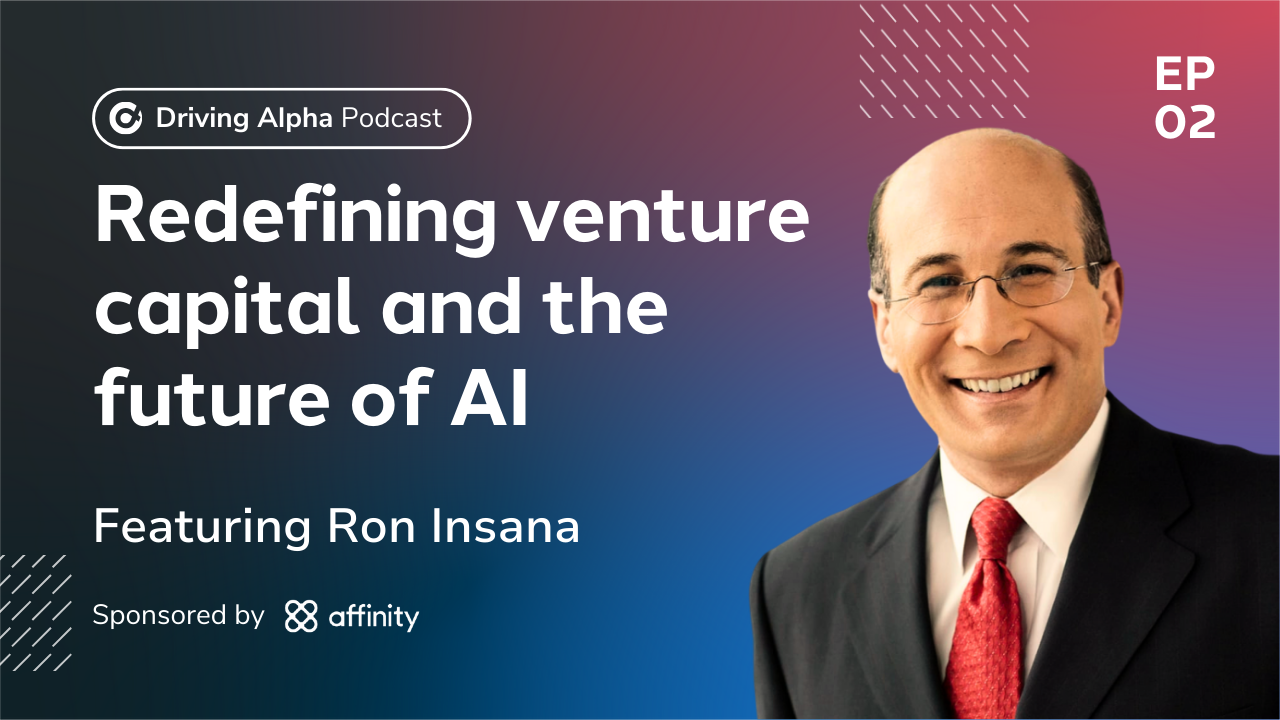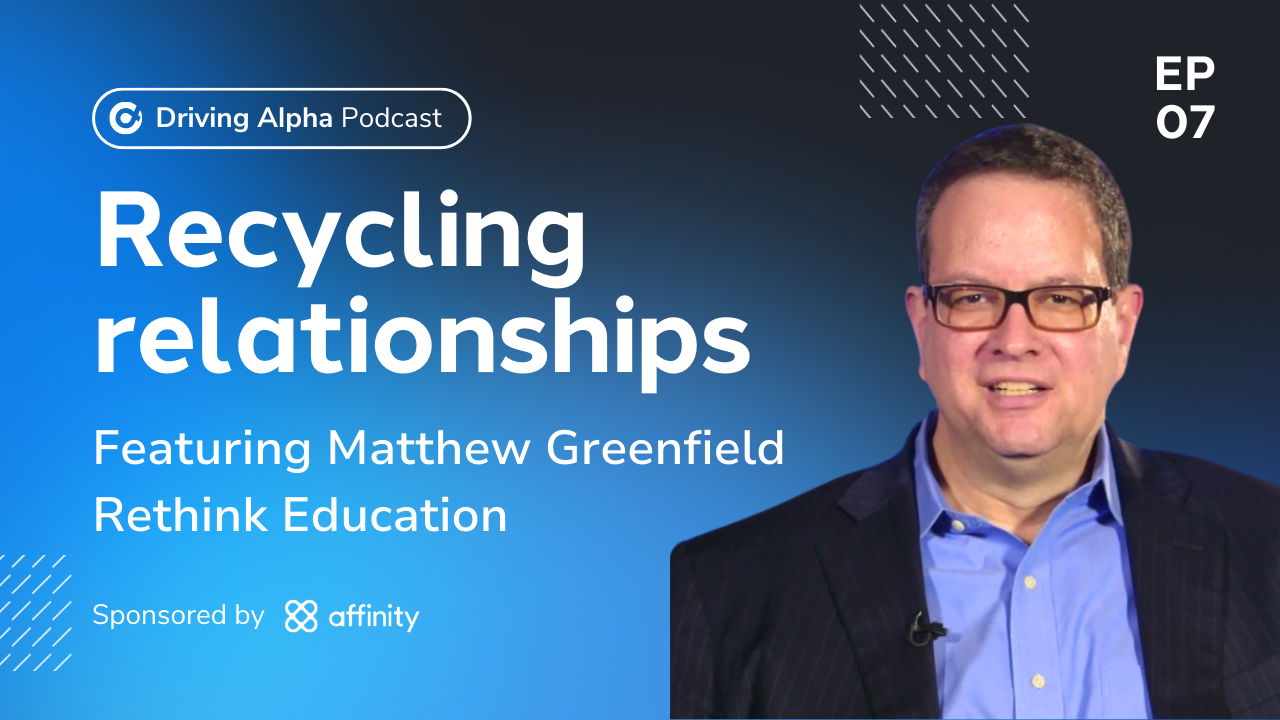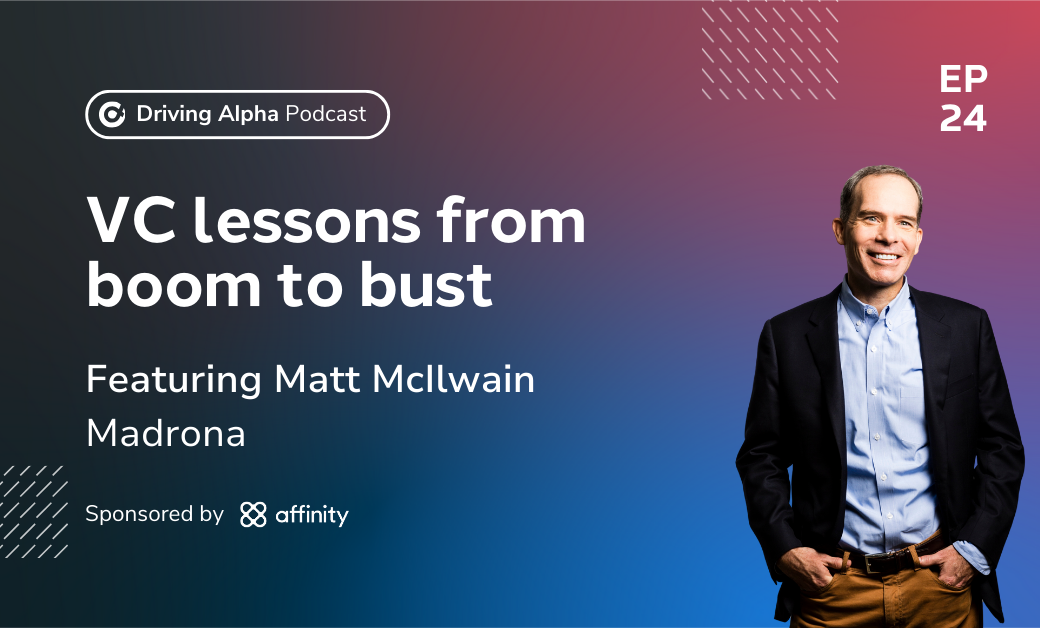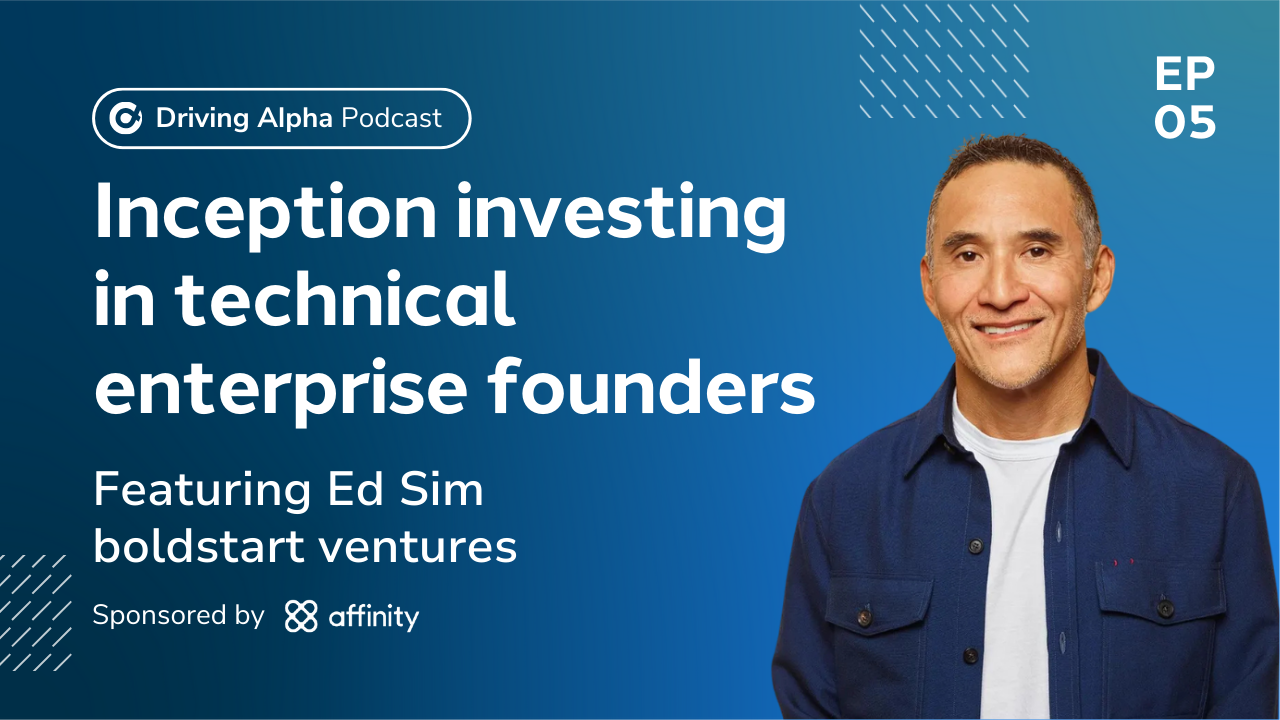Transcript
Intro: 0:01 Welcome to Driving Alpha, where we feature our friends, the outperforming investors who demonstrate their paths to driving alpha or outsized investment returns. We’re Alpha Partners, where we partner with 1,000 early-stage venture firms as their opportunity capital to invest in their best companies.
Steve Brotman: 0:26 Hi, I’m Steve Brotman, I’m your host of Driving Alpha, where together, we engage in conversations with allocators of capital and entrepreneurs in the venture capital and tech realm. The inspiration for this podcast came from a supercar event I hosted with my firm about 10 years ago with my favorite VC and investor friends and entrepreneurs. And every year, what I would do is I’d rent six exotic supercars, Lamborghinis and Ferraris, and McLarens, just for the day and invite 11 other investors, VCs and entrepreneurs to spend the day together. So each car would hold two people, a driver and a passenger. And we’d swap cars and driver positions every half hour. And it turns out that the cars are fun. But it was the people and the interactions between those people for 30 to 60 minutes at a time. That was just the best part of the day for everyone. And the food is great, and the drinks are great afterward and the dinner. But this podcast was really inspired by an attempt to recreate that type of conversation. So this is part two of my conversation with
Ron Insana:. In part one, I primarily interviewed Ron, in this episode, Ron, a longtime business TV host, interviews me.
Ron Insana: 1:44 I flip it now. What do you see coming down the pipe here in venture capital? Your damn unknown, right? Absolutely, man, I mean, you know, so waste time and in these conversations.
Steve Brotman: 1:59 You know, so like, I have to tell you, so first off, I should probably share what you know. So while I’m a smart man, um, I, I’ve had the good fortune to also kind of echo some of your career as well, in terms of, you know, benefiting from a lot of other people. But when I started this phase of my venture career, I decided that instead of competing against all other VCs and private equity firms, why not? Why not partner with them? And if they have the best idea in the world, why not compensate them for that? Right? Yeah. So.
Ron Insana: 2:45 So you change the model, basically. It’s just early days, right?
Steve Brotman: 2:49 Yeah. What’s that? You’re changing the model. And yeah, we’re changing the model. So for the first 15 years, well, first I was an entrepreneur, and then I became a software investor, as a software entrepreneur, and then an investor. And then I was like, How do I after 10-15 years? I mean, you just sort of got that mojo. And I realize, you know, what, all my friends who I took on the exotic car trips, they know so much more and have so many opportunities. It’s like, okay, if I make sort of a typical venture firm makes 20% of the profits from investing their fund. Well, the difference between a median returning venture firm, and a top 5% venture firm are hundreds, hundreds of thousands of basis points. Yeah, yeah. So a median rich venture fund might lose money, on average, or make their money back, a top decile fund might make 9-10 times their money. Right? So what if I gave up, you know, up to half my care, half the font that’s like an athame. That was like changing the model to your point that was like that, that that’s so crazy, it might just work. And so today, I work with 850 VCs that are in 78% of all technology companies. 95% of the time, they don’t have an opportunity, they don’t have the money to do their best deals. So I started, I’ve been — to get back to your original question. So I rest on the giants and have a lot of other folks who know a lot or a lot know the experience. Well, a lot more access, but to get right to the point. I think the biggest thing, at least in our lifetimes is going to be AI. Yep. Um, the recent trend has been around the software, like how can we replace, you know, journalists? Or how can we replace teachers or radiologists or, you know, but using software like book writing or movie making, and I don’t. I’m not sure it’s about replacing, I think it’s about augmentation.
Ron Insana: 5:03 Right? Yeah. I don’t disagree with you. And I think you know, and we’ll go. Going back to that type of point, right? I’ve seen estimates that 300 million people are going to lose their jobs globally, because of the implementation of AI, but there’s no quantified amount of people, yet, we’re going to gain jobs or gain employment or become more productive. Because of AI. That number is not out there yet.
Steve Brotman: 5:24 So I like to remind people that it’s now almost 250 years ago, when we started this when America started, but 200 years ago, 98% of Americans worked on a farm. No one’s crying in their soup today about how only 2% of Americans work on a farm. [continue to page 2]
Ron Insana: 5:44 Right, more output than we ever had before.
Steve Brotman: 5:47 We have more food than we ever made before yet, we all don’t have to work on a farm. So I think a lot of people lose sleep over what happened, all those farming jobs. And they forget about what can replace them, and maybe the better life for those people at the end of the day. And that’s what we have today. So I do think AI has a pernicious upside, technology has an upside and a downside. And the upside is usually 10 times better than the downside, but there are downsides. So one, within AI, I would say, we just invested last quarter in a company called shield AI, which is an AI software for aerial drones, they actually have their own drone. And, you know, if you’re going to fly a commercial drone, you’d better have an AI on board. Because if a human loses contact with that, who’s flying it, you don’t want to just flying out of the out, you know, flying out of the air or flying blind, or if it leaves his jeep GPS contact doesn’t know where it is, it needs to know, oh, I’m in the middle, I’m on top of you know, you know, a crowd of people or whatever it might be. So it’s got you got to have aI on board for certain opportunities and applications —
Ron Insana: 7:11 Is this military or civilian use?
Steve Brotman: 7:12 It’s initially military. But you know, mostly surveillance uses. And in dangerous situations that you don’t want to put a — it’s a Navy SEAL founded the company, and he would clear buildings in Afghanistan, or in urban areas. And he would lose friends and comrades going into a building. Yeah, if you could send in a drone to like, look around and make sure it was clear. Far better. Right? And military is often the first use of technology, nylon. Well, yeah, NASA and everything else. So like it makes sense for this software developed under the auspices of the military. But I think ultimately, it’s going to be commercial do us. But what it points to we’re also an investor in Gecko robotics does inspection of its, there’s 100 trillion of assets out there. pipelines, buildings, bridges, tunnels, airports, they all need to be inspected. And robots can inspect those things much better. They can, they can do it more repeatedly, they can do with much more sensors, what the concrete degradation is the heat the moisture, and then record all that and then watch the trends, right and detect when a breach is actually having issues. And whether it’s increasing or whatever it might be. So these are massive problems that AI is going to go after. But what I’m getting to is that I think what’s lost is the physical manifestation of AI.
Ron Insana: 8:51 I was about to ask you that. So what we’ve seen so far, and I think people are wrongly interpreting this rally in the Magnificent Seven, such as it is, as a bubble. We haven’t seen the rollout of AI yet. From an implementation standpoint, if there’s going to be a bubble, there’s going to be a bubble, right, but I’ll hold out the possibility that that happens. But we’re not there yet. And you’re still investing early stage in the companies that 2, 3, 5 years from now are gonna come public, and as you say, manifest what AI has to offer.
Steve Brotman: 9:27 Yeah, it’s really at the growth stage. I, you know, that’s where we focus on in our, in our VC partners focused on the early stage, we’re sort of where the company gets to $10-20 million in revenue, right? So it’s not just an idea. Um, but lately, um, so that’s, that’s where I think that’s the interesting point is when AI starts not just doing you know, you know, sending you funny cat pictures, or making up cool videos, but when it starts impacting the physical world, that’s That’s kind of interesting. Um, a company called Figure recently raised a ton of money in the humanoid robotics space. And just to give you a sense of how big a market that is 50% of world GDP is human labor.
Ron Insana: 10:19 So now this but this, okay, so the status the other question is displacement, does that mean 50% of global GDP becomes robotic? And then that percentage of the population is in search of income?
Steve Brotman: 10:34 It’s about — it’s going to take 200 years, just like farming? Yeah. So it was. I don’t think it’s going to be instantaneous. It’s going to take a long, long time, maybe not 200 years. But it’s there’s going to be and then the value they have this is. So I don’t know if this is feasible within the next five or 10 years. But I think there’s sort of the drumbeats of physical manifestations. And I think, I think that it’s going to be, you know, think about all the jobs that need to be done that don’t want to get done.
Ron Insana: 11:16 I mean, even Amazon’s got what they’ve been a robot that can load 1,000 boxes per hour onto a conveyor belt, which no human can do. What percent of GDP is janitorial services? Yeah. Yeah. Right. Like another, you know —
Steve Brotman: 11:30 Then you’ve got, you know, that those are jobs that people don’t want, necessarily. The graveyard shifts in sorting and packing pick. Yeah, like sorting mail. You know, 1% of Americans work in the mail in the US Postal Service. Yeah. Yeah. Like is that? Could they have better? Could they have better opportunities and better uses of those people? And by the way, we’ve got the biggest generation of elderly people. Yeah. Ever going to be in South Korea, they have a replacement rate of point six. Yeah. How are those people going to be cared for if there’s not a humanoid robot?
Ron Insana: 12:14 Sense, like it’s Twilight Joanie.
Steve Brotman: 12:16 You know, well, you know, it may be just in time. Um, you know, I think, I think, how do you get along without your, your phone today, or your PC couldn’t? Right, you’re gonna, everyone’s gonna have what’s gonna be a mate was so that’s, that’s the cool part, is it? Today, it’s unthinkable 20 or 30 years ago, that that 80% of the world population has a computer, in their phone, smartphone, with high bandwidth, everything else, they can entertain themselves, they can, they can educate themselves, they can, you know, just did just that with this, they can do anything.
Ron Insana: 13:00 What I find, you know, I look at my, I get my screen time, you know, readings every week, and it’s an inordinate amount of time. But most of my time, like, I’m not messing around on my phone, I’m reading the news, I’m finding research, I’m the you know, I’m, when before I go to sleep, you know, I’m scrolling through X or Twitter, whatever the hell it’s called. And, you know, looking for other items that I missed during the day. And that’s, you know, you had to go somewhere when I was younger to do that. And
Steve Brotman: 13:29 That’s exactly right. What I wanted to get to, though, is 200 years ago to have a man servant. Yeah. Right. You had to be rich. Yeah. You know, 30 years ago, to have a TV, you had to be rich. Today, you don’t have to be rich to get an education, right. You don’t have to be rich to get educated, watching YouTube. You don’t have to be rich to even talk to your even to talk. Like, even like if you’re a nanny in another country, as an immigrant, you can still talk to your family every day alive on video, like 200 years ago, that wouldn’t have happened. So I would say and, you know, maybe in 50 years, everyone has their own service. Yeah. And we’re making, we’ll make everyone, everyone is going to have that, that means that everyone’s going to have the level of wealth that only maybe billionaires had today.
Ron Insana: 14:24 Then subsequently turned on by longevity science, which is also getting fairly weird at this point. From a very conventional view of it.
Steve Brotman: 14:34 You know, it’s um, I you know, in terms of biotech, I don’t tend to focus on biotech as much. I have, you know, because of my feelers with our 850 VCs, we do get that sort of inbound interest level of stuff coming in. And you know, it feels like borderline quackery right now. It just seems like it’s not. We’re not there yet. We’re not at our AI moment. Right or longevity. You know, I was pitched as a headset that sits on your head and vibrates and has some tones and stuff. And apparently it reduces plaque wane brain plaque. Alzheimer’s. Yeah. Like, I don’t know, that’s a multi trillion dollar market. If it works, it works. It works. And it doesn’t kill the person in the process. I mean, I’d or even a brain plaque is really the thing causing Alzheimer’s right? It might not even be the whole biotech stuff. So actually, I’m gonna have one of my bigger investors, a guy named Joe Edelman. I’m gonna have him on Joe’s show runs perceptive life. It’s one of the biggest biotech hedge funds. He’s probably the most successful biotech investor of his generation. But I’m, I’m so excited to have to start Driving Alpha as a podcast and you’ve been an inspiration to me. Okay, so same back, you know, thank you for, you know, coming on.
Ron Insana: 16:20 The question before we wrap.
Ron Insana: 16:22 Yeah, no, just to follow up on the AI thing, just with respect to that this can reward prospects here. Every time I go out and give a speech and talk about AI, people want to know whether it’s going to destroy humanity, or help it whether it’s Skynet, Terminator events are going to take place and you know, they’re rather pedestrian questions in a certain respect. But, you know, you when you’re listening to regulators and legislators, when you’re watching television, or whatever medium you choose to engage with. There’s constantly this drumbeat that this can be the thing that destroys us whether it’s a accidentally triggering, triggering a nuclear war, because we hand off, you know, the control of systems to artificial intelligence, or so on and so forth. There’s a large fear factor here at the moment.
Steve Brotman: 17:11 Yeah. And I think it’s, it’s, I think, when I’ve, I’ve talked to entrepreneurs in this arena before, if you think about nuclear energy, it’s really too bad that the first use of nuclear energy was Hiroshima and Nagasaki. So, you know, I think nuclear power, I, you know, it’s starting to, you know, I think it suffered a pretty grievous blow, and other uses for nuclear. Um, once that happened. And so like, I’m hopeful that we don’t have like drone armies. And that’s how we get to know drones as opposed to, hey, this is my caregiver. Or, you know, what’s interesting is that most, a lot, what I’ve been learning about this is that most tasks don’t require human human level consciousness. Right.
Ron Insana: 18:19 I pick weeds before. I picked weeds.
Steve Brotman: 18:24 Yeah, like most, most TAS don’t require a level of human consciousness that we’re taught, we’re talking about taking that box and moving it over there on this platform, right are taking my garbage out. You know, we’re not talking about human level intelligence. And these machines. It’s, I think, just like, full folder, you know, full FST. Is it called autonomous driving? Oh, yeah. You know, Elon keeps on talking about it as it’s gonna come next year. I think we’re still 20 years away. Absolutely. And we’ve always been 20 years away. Yeah. And so like, you know, I think that these are interesting. Um, it’s, it’s kind of like a funny horror movie. Or a scary sci fi movie, but I think we’re a long long way away from a probably maybe even 50 or 100 years. I don’t know that for a fact. But from what I’ve seen, you know, from truly true human intelligence, I think it’s a ways away, certainly not in your lifetime or in my lifetime.
Ron Insana: 19:44 I don’t think — I don’t open it. Just longevity stuff extends out a little bit. So again, we’re talking about Yeah, born too soon, right? I mean, no matter who you are, you’re born just a little too soon.
Steve Brotman: 19:56 We might be the last generation that’s going to die. So that’s the process.
Ron Insana: 20:00 Is that right? The first, the first person to live to 250 has been born among millennials. At least that’s the belief. Yeah, no.
Steve Brotman: 20:07 So like, I don’t I think, I think it’s I think now there’s going to be a lot of people who disagree and think this is going to happen sooner. But I think the population, um, you know, just like the reaction to autonomous driving, I think is going to be pretty resistant. And that’s ultimately, you know, human behavior. It’s going to take a while before you and I are going to be okay. With a robotic man serving. Or woman serving or persons.
Ron Insana: 20:39 The latter half, maybe not.
Steve Brotman: 20:43 Yeah, a lot of it, you know, the ad bypass level, maybe we’re gonna not have any choices. And we won’t know, yet. Not a person or a robot. But, yeah, I just think they’re from what I’ve seen so far. They’re much more like calculators. Right. And they’re not, you know, can it be? Can they be programmed to be hunter killer things? I think there’s that aspect. And we’re going to have to, I think there’s going to have to be some regulation around that. For sure. You know, I don’t think we’re there yet. But, you know, I think even with the shield, AI and autonomous drones, the US policy is a human asked to be in a loop or a decision that involves a deadly force. Right. So, you know, our adversaries unfortunately don’t necessarily have that limit. So that’s really going to be that’s going to be that’s going to have to be hopefully President Biden will have a, an opportunity to cut that piece piece deal, right, with our adversaries to say, hey, let’s some let’s say that, you know, if you if you use those weapons, a human needs to be cognizant, and part of that process, but it’s a it’s an interesting world. And, yeah, we’re part of it. We still are, and I hope to be and maybe you’ll, on some of these interviews, you’ll help me, give me some pointers or maybe even come on to our man. All right, excellent. Well, thanks a lot, Ron. Time and maybe we’ll do this against him. Love to — absolutely. Thanks for having me. All right. Thanks.
Outro: 22:43 Thanks for listening to the Driving Alpha podcast, where we host top investors to demonstrate how they outperform the market. Click subscribe so you don’t miss future episodes.



